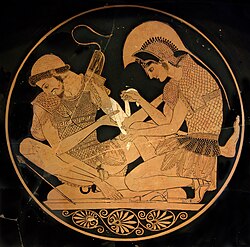| Trojan War |
|---|
 |
This article includes a list of general references, but it lacks sufficient corresponding inline citations .(April 2024) |
There are a wide range of ways in which people have represented the Trojan War in literature and the arts.
| Trojan War |
|---|
 |
This article includes a list of general references, but it lacks sufficient corresponding inline citations .(April 2024) |
There are a wide range of ways in which people have represented the Trojan War in literature and the arts.
Innumerable ancient items, including: